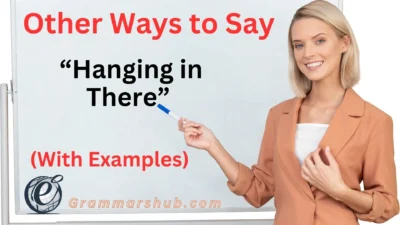Finding the right words to express care and thoughtfulness can make a big difference in how your message resonates. While “you’re welcome” is classic, exploring alternatives allows your responses to feel more personal, warm, and unique. In this guide, you’ll discover 30 thoughtful alternatives, complete with meanings, explanations, and examples to help you express yourself effortlessly.
What Does “You’re Welcome” Mean?
The phrase “you’re welcome” is a polite response to someone who thanks you. It acknowledges gratitude while conveying kindness and humility. Often, it’s used to maintain social harmony and express goodwill.
Meaning: An acknowledgment of gratitude.
Definition: A response that indicates the gratitude received is appreciated.
Explanation: This phrase has its roots in the Old English word wilcuma, meaning a person whose coming is pleasing.
Example Scenario:
- Someone says, “Thanks for helping me move!”
- You reply, “You’re welcome!”
Best Use: Everyday conversations to show politeness and grace.
Tone: Neutral, kind, and accommodating.
Is It Professional/Polite to Say “You’re Welcome”?
Yes, it is professional and polite to say “you’re welcome.” However, the context and tone matter. In some formal or warm settings, alternatives may better convey professionalism or emotional nuance.
Advantages and Disadvantages of Saying “You’re Welcome”
Advantages
- Universally understood.
- Simple and polite.
- Works across casual and formal settings.
Disadvantages
- May feel overused or impersonal in emotional contexts.
- Lacks variety, which can make interactions seem routine.
Synonyms for “You’re Welcome”
- No Problem
- My Pleasure
- Anytime
- It Was Nothing
- Don’t Mention It
- Of Course
- Happy to Help
- Sure Thing
- Absolutely
- You Bet
- Glad to Help
- Not at All
- It’s Nothing
- You Got It
- No Worries
- Always Happy to Help
- It’s My Duty
- You’re Most Welcome
- It’s a Pleasure
- Think Nothing of It
- With Pleasure
- Glad I Could Help
- By All Means
- I’m Here for You
- Don’t Worry About It
- That’s What I’m Here For
- You’re All Set
- Not a Problem at All
- No Biggie
- It’s All Good
1. No Problem
Meaning: A way to downplay the effort involved in helping.
Definition: Suggests that the task was easy or unburdensome.
Explanation: This phrase conveys a laid-back, friendly demeanor, reassuring the recipient.
Scenario Example:
- Friend: “Thanks for picking up my groceries!”
- You: “No problem!”
Best Use: Casual interactions with friends or peers.
Tone: Informal, easygoing, and approachable.
2. My Pleasure
Meaning: Indicates joy or satisfaction in assisting someone.
Definition: A response that emphasizes enjoyment in helping.
Explanation: This alternative conveys warmth and a genuine desire to assist.
Scenario Example:
- Colleague: “Thanks for covering my shift!”
- You: “My pleasure!”
Best Use: Professional or formal settings to convey politeness and enthusiasm.
Tone: Polished, warm, and professional.
3. Anytime
Meaning: Offers an open invitation for future help.
Definition: Suggests you’re available to assist at any moment.
Explanation: This response builds trust and a sense of reliability.
Scenario Example:
- Neighbor: “Thanks for helping fix my bike!”
- You: “Anytime!”
Best Use: Building rapport in friendly or casual relationships.
Tone: Friendly and reassuring.
4. It Was Nothing
Meaning: Minimizes the effort involved in helping.
Definition: Suggests that the act required no significant effort.
Explanation: Conveys modesty and downplays any sense of obligation.
Scenario Example:
- Friend: “Thanks for helping me clean up!”
- You: “It was nothing!”
Best Use: Casual conversations where humility is key.
Tone: Humble and sincere.
5. Don’t Mention It
Meaning: Encourages the recipient not to feel indebted.
Definition: Suggests that the favor was small and unworthy of thanks.
Explanation: Reflects humility and discourages a sense of formal gratitude.
Scenario Example:
- Stranger: “Thanks for holding the door!”
- You: “Don’t mention it!”
Best Use: Casual to semi-formal settings.
Tone: Lighthearted and modest.
6. Of Course
Meaning: Emphasizes the obviousness of offering help.
Definition: Suggests that helping was a natural or expected action.
Explanation: Conveys a sense of reliability and willingness.
Scenario Example:
- Partner: “Thanks for making dinner!”
- You: “Of course!”
Best Use: Close relationships to show genuine care.
Tone: Warm and caring.
7. Happy to Help
Meaning: Expresses joy in being helpful.
Definition: Highlights a positive attitude toward assisting others.
Explanation: This response adds an emotional touch of enthusiasm.
Scenario Example:
- Client: “Thanks for your quick response!”
- You: “Happy to help!”
Best Use: Professional and formal interactions.
Tone: Upbeat and polite.
8. Sure Thing
Meaning: Confirms a willingness to assist.
Definition: A friendly way of affirming help.
Explanation: This alternative reflects positivity and openness.
Scenario Example:
- Friend: “Thanks for the ride!”
- You: “Sure thing!”
Best Use: Informal and relaxed conversations.
Tone: Cheerful and friendly.
9. Absolutely
Meaning: Strongly affirms the action taken.
Definition: Indicates enthusiasm and complete agreement.
Explanation: This term emphasizes a strong commitment to help.
Scenario Example:
- Colleague: “Thanks for staying late to help!”
- You: “Absolutely!”
Best Use: Professional and casual settings.
Tone: Confident and affirmative.
10. You Bet
Meaning: Assures the recipient of your willingness to help.
Definition: A casual way of saying, “Of course.”
Explanation: Reflects friendliness and enthusiasm.
Scenario Example:
- Friend: “Thanks for the advice!”
- You: “You bet!”
Best Use: Informal settings.
Tone: Relaxed and approachable.
11. Glad to Help
Meaning: Reflects joy in providing assistance.
Definition: Shows genuine happiness in being able to assist someone.
Explanation: This phrase adds a layer of gratitude and sincerity to your response, making it feel heartfelt.
Scenario Example:
- Friend: “Thanks for helping with my homework!”
- You: “Glad to help!”
Best Use: Personal interactions where warmth is important.
Tone: Cheerful and kind.
12. Not at All
Meaning: Downplays the need for gratitude.
Definition: Suggests the favor was so minor it doesn’t warrant a thank-you.
Explanation: This expression minimizes your effort, making the recipient feel at ease.
Scenario Example:
- Neighbor: “Thanks for lending me your lawnmower!”
- You: “Not at all!”
Best Use: Friendly and semi-formal settings.
Tone: Modest and casual.
13. It’s Nothing
Meaning: Reduces the significance of the favor.
Definition: Indicates that the act was effortless or insignificant.
Explanation: This phrase reassures the recipient that no inconvenience occurred.
Scenario Example:
- Stranger: “Thanks for helping me pick up my dropped groceries!”
- You: “It’s nothing!”
Best Use: Casual or polite conversations.
Tone: Humble and soft.
14. You Got It
Meaning: Confirms a willingness to assist.
Definition: A casual way to say, “Of course I helped.”
Explanation: This term conveys a positive and straightforward attitude.
Scenario Example:
- Friend: “Thanks for grabbing that for me!”
- You: “You got it!”
Best Use: Informal settings, especially with close friends.
Tone: Friendly and confident.
15. No Worries
Meaning: Suggests that the act of helping was effortless.
Definition: Reassures the recipient that no inconvenience occurred.
Explanation: This phrase offers a laid-back, carefree vibe.
Scenario Example:
- Friend: “Thanks for covering my shift!”
- You: “No worries!”
Best Use: Casual interactions with peers.
Tone: Relaxed and reassuring.
16. Always Happy to Help
Meaning: Reinforces the joy of assisting others.
Definition: A more emphatic version of “happy to help.”
Explanation: This response conveys a strong sense of reliability and generosity.
Scenario Example:
- Client: “Thanks for clarifying those details!”
- You: “Always happy to help!”
Best Use: Professional or formal interactions.
Tone: Enthusiastic and polite.
17. It’s My Duty
Meaning: Indicates that helping was part of your responsibility.
Definition: Suggests a sense of obligation and pride in assisting.
Explanation: This phrase works well in contexts where professionalism is key.
Scenario Example:
- Customer: “Thanks for resolving my issue so quickly!”
- You: “It’s my duty!”
Best Use: Workplace or formal conversations.
Tone: Professional and serious.
18. You’re Most Welcome
Meaning: An elevated version of “you’re welcome.”
Definition: Emphasizes warmth and courtesy in your response.
Explanation: This phrase adds elegance and sincerity to traditional politeness.
Scenario Example:
- Guest: “Thanks for inviting me to your party!”
- You: “You’re most welcome!”
Best Use: Formal or special occasions.
Tone: Polite and gracious.
19. It’s a Pleasure
Meaning: Highlights enjoyment in providing help.
Definition: Expresses that assisting was a gratifying experience.
Explanation: This response offers a blend of warmth and professionalism.
Scenario Example:
- Client: “Thanks for your time today!”
- You: “It’s a pleasure!”
Best Use: Business settings or polite interactions.
Tone: Polished and courteous.
20. Think Nothing of It
Meaning: Dismisses the need for acknowledgment.
Definition: Suggests that the favor was insignificant.
Explanation: This phrase reassures the recipient while showing humility.
Scenario Example:
- Friend: “Thanks for helping me set up the table!”
- You: “Think nothing of it!”
Best Use: Semi-formal or casual settings.
Tone: Humble and lighthearted.
21. With Pleasure
Meaning: Expresses genuine joy in assisting.
Definition: Indicates that helping was a delightful experience.
Explanation: This phrase conveys enthusiasm and warmth, adding a touch of sincerity.
Scenario Example:
- Guest: “Thanks for hosting such a wonderful dinner!”
- You: “With pleasure!”
Best Use: Formal settings or heartfelt occasions.
Tone: Elegant and warm.
22. Glad I Could Help
Meaning: Reflects personal satisfaction in being useful.
Definition: Acknowledges the act while showing modesty and happiness.
Explanation: This response conveys humility and gratitude for being able to contribute.
Scenario Example:
- Colleague: “Thanks for your guidance on the project!”
- You: “Glad I could help!”
Best Use: Professional and casual settings.
Tone: Polite and humble.
23. By All Means
Meaning: Encourages or supports the act of gratitude.
Definition: Suggests wholehearted willingness to assist.
Explanation: This phrase has an old-world charm and a sense of eagerness.
Scenario Example:
- Stranger: “Thanks for letting me borrow your pen!”
- You: “By all means!”
Best Use: Formal or polite conversations.
Tone: Gracious and supportive.
24. I’m Here for You
Meaning: Reassures the recipient of your support.
Definition: Indicates a readiness to assist when needed.
Explanation: This response conveys emotional warmth and dependability.
Scenario Example:
- Friend: “Thanks for listening to me vent!”
- You: “I’m here for you!”
Best Use: Personal or emotional contexts.
Tone: Caring and empathetic.
25. Don’t Worry About It
Meaning: Minimizes the importance of the favor.
Definition: Suggests that the act was not a big deal.
Explanation: This phrase reassures the recipient and reduces any sense of obligation.
Scenario Example:
- Neighbor: “Thanks for watering my plants!”
- You: “Don’t worry about it!”
Best Use: Friendly or casual interactions.
Tone: Relaxed and reassuring.
26. That’s What I’m Here For
Meaning: Indicates that assisting is part of your role or nature.
Definition: Shows willingness and readiness to help.
Explanation: This phrase adds a sense of reliability and purpose.
Scenario Example:
- Colleague: “Thanks for fixing the issue so quickly!”
- You: “That’s what I’m here for!”
Best Use: Professional or supportive settings.
Tone: Dependable and encouraging.
27. You’re All Set
Meaning: Indicates the completion of assistance.
Definition: Suggests that everything needed has been taken care of.
Explanation: This phrase works well when you want to reassure someone.
Scenario Example:
- Customer: “Thanks for helping me with my order!”
- You: “You’re all set!”
Best Use: Professional or transactional interactions.
Tone: Reassuring and efficient.
28. Not a Problem at All
Meaning: Minimizes the effort required in helping.
Definition: Emphasizes ease and willingness to assist.
Explanation: This phrase offers reassurance and a touch of warmth.
Scenario Example:
- Friend: “Thanks for driving me to the airport!”
- You: “Not a problem at all!”
Best Use: Casual and polite conversations.
Tone: Friendly and comforting.
29. No Biggie
Meaning: Suggests that the act was insignificant.
Definition: A casual phrase that minimizes the importance of the favor.
Explanation: This term is often used in lighthearted or informal settings.
Scenario Example:
- Friend: “Thanks for letting me borrow your jacket!”
- You: “No biggie!”
Best Use: Informal and friendly interactions.
Tone: Casual and playful.
30. It’s All Good
Meaning: Indicates that the act required no trouble.
Definition: Suggests there’s no need to worry or overthink gratitude.
Explanation: This phrase offers a relaxed, easygoing response.
Scenario Example:
- Stranger: “Thanks for helping me cross the street!”
- You: “It’s all good!”
Best Use: Casual, informal settings.
Tone: Relaxed and positive.
Conclusion
Whether in professional settings, heartfelt moments, or casual chats, the way you respond to gratitude can shape how others perceive your kindness. Using these alternatives to “you’re welcome” adds depth and warmth to your interactions, making them feel more personal and thoughtful. Experiment with these phrases to find the ones that resonate most with your personality and tone.




